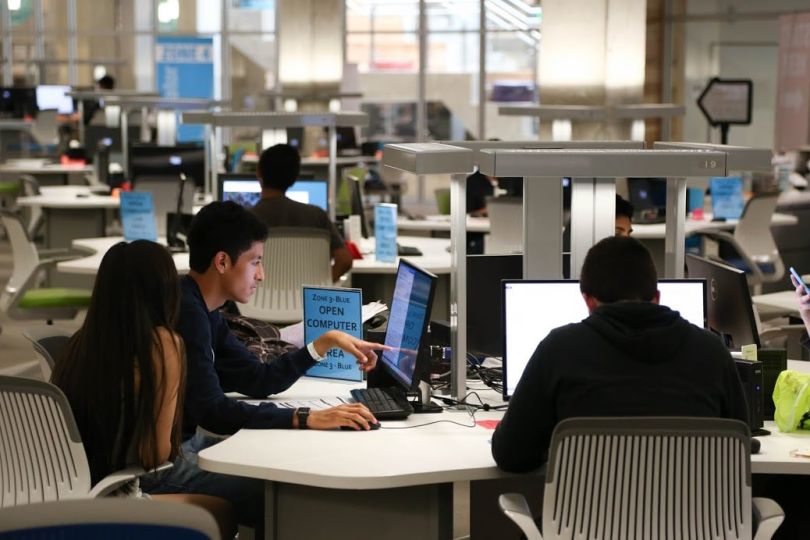“Through our graduate programs and our community partnerships, we really want our business students to experience Austin in a seamless fashion,” said Dr. Nancy Schreiber, Dean and Professor of Management for The Bill Munday School of Business.
Over the past two years, St. Edward’s has partnered with Capital Factory to offer 10 work spaces for five business students and five natural science students. The university selects the individuals through an application process based on their engagement in startup activities of their own for about a semester long. This gives the students the opportunity to work alongside area entrepreneurs, attend events and network with business leaders in the community.
Last year, three students from the School of Natural Sciences won first place at Capital Factory’s Apple TV Hackathon in creativity and innovation for an app they designed merging two data sources.
“[The students] are very keen, even before graduating, in getting their ideas out there, and Capital Factory is a beautiful idea to give them that taste and those connections,” said Dr. Gary Morris, Dean of Natural Sciences.
St. Edward’s also hosts an annual Business Plan Competition and the iChallenge pitch that lasts a year long, beginning with iChallenge, where students pitch their business ideas. If selected by a group of panelists, the students then move to the next phase, meeting with Austin mentors who help the students develop a business plan.
Additionally, St. Edward's established partnerships with the Austin Tech Council, hosted resume workshops and career bootcamps to prepare students for internship interviews, and have worked frequently with Austin + Social Good and Impact Hub Austin to promote supporting businesses with a social impact.
“It’s really important to look at the prophecies that drive startup business,” said Schreiber. “I’m hoping we can get some workshops slated in design thinking, and utilize the liberal arts education that is our foundation. Having this kind of town pair with us — it’s a great opportunity.”
The University of Texas at Austin
In February, we ran a piece highlighting 31 UT grads who founded local tech companies like TabbedOut, uShip and 3 Day Startup. Here’s how the undergraduate and graduate schools of Texas continue to grow Austin’s booming startup culture.
Undergraduate
In the fall, undergraduate students from any college can register for the Longhorn Startup Seminar, featuring industry leaders sharing their stories and experiences founding their own companies. The seminar includes Q&A between students and founders, the chance to pitch ideas to the class, and speed-dating events to meet potential co-founders and receive advice from mentors. This year marks their largest class yet with over 150 students.
In the spring, the Longhorn Startup Lab provides students who are building scalable technology companies with the semester-long opportunity to earn real course credit for working on their startups while in school. Students get to meet for one-on-one mentor sessions weekly, work out of the coworking space at Capital Factory, and wrap up the semester in a Demo Day, when students get to present their companies to the Austin community.
Graduate
The McCombs School of Business has graduated 126 students that went on to found their own startups, according to Dr. Rob Adams, who teaches New Venture Creation for both UT MSTC and UT MBA, and runs Texas Venture Labs.
Adams said that once students have left the program, 37 percent of the time, their startups have received outside funding, totaling $388 million over the years.
"The university is proactively trying to make this happen," said Adams. "Part of that funding number is because Austin is a good startup community. All the stuff we do, we don’t reproduce what is already available. We’re not a law firm. We don’t invest money. We know who the investors are so we bring them in. We don’t provide space. We’re trying to be complementary of all the other stuff that is commercially available."
Adams and his team essentially do two things. One, they help grad students start, fund and grow companies as they earn their degree. And two, they create cross-functional teams from various grad programs like law, computer science, business and architecture, and pair them with local companies that are raising money and professionally managed.
One of the key takeaways, Adams said, is to educate the students that launching your own startup is not easy.
"Success is 10 to 20 percent," said Adams. "We're going to show you how to mitigate risk and increase chance of success."
Austin Technology Incubator
The 27-year-old Austin Technology Incubator is the startup incubator of the University of Texas at Austin and a program of the University’s IC2 Institute. Every semester, ATI hires 30-35 students from across UT to work at the incubator (many of whom go on to work internships for participating companies), while also collaborating with faculty from Texas Venture Labs and Startup Studio in Engineering.
In 2014, 88 percent of the graduating class of the incubator received funding while at ATI, 17 companies raised more than $1 million, and three startups raised more than $5 million.
“The business model is not about getting money from office space or from the companies,” Bart Bohn, partner at ATI and director of the IT & Wireless incubator, said. “It’s about doing whatever we can to support [the startups]. Most incubators are real estate plays. We are about strategic impact.”
Austin Community College
With 11 campuses and four additional sites, ACC has developed incubators, accelerator programs, and a program specific to increasing the number of women in developer IT positions, with more initiatives to support the local startup movement over the next three years.
The Accelerator Programmer Training Program, offered at ACC's Highland Campus in the ACCelerator, provides students currently employed with an avenue to quickly learn computer programming.
"Students come in, and if they get through the Java course, which traditionally takes about 16 weeks, in four weeks, then they are done," said Linda Smarzik, ACC Dean of Arts, Digital Media, and Communications and Dean of Computer Science and Information Technology. "We are accelerating their learning in such a way so that they can make the choice of if they'd like to get a job in this field or launch their own business."
ACC's Women in Information Technology program educates and supports women interested in entering IT, offering certificates and degree plans in one of four IT career pathways.
"It’s such a high paying job, and yet there are only about 24 percent women in the IT field. We’re creating a culture in which women feel much more comfortable in the world of IT," said Smarzik, adding that ACC's accelerator program consists of 40 percent women.
Additionally, in ACC's Continuing Education program, the college offers 100 certification programs including computer science and healthcare ingrained with entrepreneurial skills like marketing, social media, business planning and basic accounting.
Over the next three years, ACC will continue its Phase 2 roll out of the Highland Learning Center with three incubator programs and a digital creative media center, where students across various fields of study will team up and provide branding packages to local startups that request additional help.
"The college is looking more into how to use our facilities, equipment, and people to help small businesses in our area, and in doing so, help our students," said Dr. Hector Aguilar, ACC Dean of Continuing Education.







